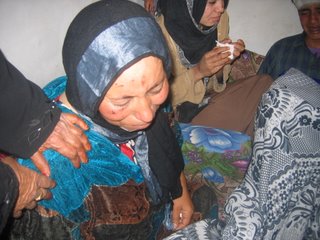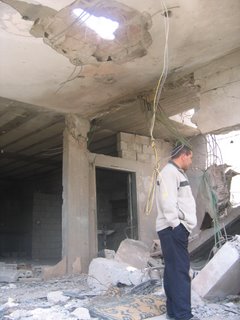Food for thought; a piece written by Alistair Crooke, a former mi6 officer who did a lot of the back-channel diplomacy for the eu in israel/palestine during this intifada, for Propsect Magazine (it is by subscription only so I took the liberty of pasting the entire article below)
Back to 1967 'Hamas' failure to recognise Israel will not be an issue if Palestine itself is recognised'
BY ALASTAIR CROOKEOn the face of it, the Hamas refusal to recognise Israel seems singularly
perverse; plainly Israel “exists”! Tel Aviv is a large modern city that
shows no sign of any imminent slide into the sea. To us in the west, this
posture has the taint of ideological backwardness which we often associate
with Islamist movements whom we find curiously at odds with modern
reality. Hamas, however, is neither stuck in the past nor unable “to do
politics” – as the Americans might say. What they are doing in dramatic
fashion is to put a finger on a key failure of the Israeli – Palestinian
political process since the Oslo Accords were signed in 1993 – which is
the singular omission of any clear outline of Palestinian rights. Hamas is
correct: the starting point for any next steps, whether political or in
terms of an extended armistice, needs this prior commitment.
What Hamas is saying in refusing to recognise Israel is that whilst the
West understands, and indeed feels, the narrative of the Jews; there has
been no concomitant recognition of the Palestinian narrative of injustice
that they feel in respect to the events of 1948 when villages and houses
were destroyed, many were killed and thousands fled to the refugee camps
where those who survive still remain. I met one of those in Sabra and
Shatila camp in Lebanon at the end of last month. This proud woman still
retained her father’s seal of office as mayor of his village from the time
of the founding of Israel and an unredeemed account owed by the British
mandate authorities for £68 – a considerable debt at that time. Hamas are
suggesting that recognition of this Palestinian narrative should take the
form of an affirmation of the Palestinian rights to a State that should
indicate its basis as Israeli withdrawal from Palestinian lands conquered
in 1967.
It may surprise readers that this is not already the case: We recognise
and repeat frequently the right of Israel to a State within secure
borders, and it might seem obvious that we have outlined Palestinian
rights to a State shaped on the basis of the lines of ’67 or the armistice
lines of ’49 which are almost identical in the Palestinian context. In
fact we have not. UN resolution 242 refers to withdrawal from lands
conquered in ’67. Israel put much effort into lobbying to have the word
“the” dropped from the sentence “withdrawal of Israeli armed forces from
(the) territories occupied in the recent conflict”. Israel interprets this
to mean that the amount of land from which they withdraw is for them to
decide in any negotiations with the Palestinians.
Bill Clinton, at the time of the last Camp David talks in 2000 came close
to setting out signposts for the destination of talks when he outlined his
10 point plan. His initiative however never took substance. Similarly,
when Clinton asked Senator Mitchell to report on the causes of the
Intifada, we (I was a staff member) were forbidden by the incoming US
Administration to signpost the likely shape of a Palestinian State. Over
simplified, the Mitchell Report outlined three components to a solution:
de-escalate the violence, build confidence and start talking.
The fourth chapter, “..and talk about what?” which was the obvious sequel,
was denied to us. I recall the US official, Flynt Leverett who drafted the
“Roadmap” before it was adopted by the international Quartet of the US,
the UN, the EU and Russia told me that he had made explicit reference in
the first drafts to a Palestinian State on the basis of the lands occupied
in ’67 with Jerusalem as its capital; but twice this reference was removed
on instructions from above. Leverett has emphasised that the widely held
view that the Roadmap would lead to a Palestinian State on the lines of
‘67 has no basis in terms of the wording of the document. None of these
efforts, of course, were intended to go beyond setting broad parameters of
a State, whilst leaving the details to be settled between the parties.
Hamas is asking for this omission to be rectified. In asymmetrical
negotiations between parties of such different political weight and
military strength, it is not surprising that the party with almost no
cards to play wants to know what is on the table before they begin to show
their hand. If this is done, Hamas has said that it is able to deal with
reality of Israel in the course of this process. Indeed reality would be
hard to ignore given that Hamas wants an armistice to be fully negotiated
to include, borders, customs, passage and overflights inter alia!
Is “recognising reality” then a short-changing of Israel’s longstanding
quest for legitimacy? In one sense it is: It is unlikely that Hamas would
ever undertake to say that what happened to Palestinians in ’48 as a
result of events that happened earlier in Europe was in some way right or
legitimate. They cannot; but the wording does suggest the solution: No
observant Jew can deny God’s gift of all the Promised Land to the Jewish
people. Jews manage this by dividing time into redeemed time and
unredeemed time. In redeemed time, God’s promise will be fulfilled. In
unredeemed time, we have to deal with reality, and make compromises.
Similarly no observant Muslim can deny the Waqf, the endowment of Arab
lands dedicated to Islam, of which Palestine is a part. Thus Hamas can
accept reality, but it cannot say that Israel, and the way in which it
came into being is somehow “legitimate”.
The solution to resolving the recognition issue, and, incidentally, to
putting the political process on the sound footing that it never had, is –
as Hamas says – an affirmation of the parameters of the State to which
Palestinians have the right to aspire. This should not be impossible
obstacle to anyone with the courage to give a lead. President Bush in his
speech of 26 May 2005 in the Rose Garden at the White House said that the
Armistice line of ’49 should be the basis of talks, and that any change to
it can only come about by mutual agreement between the parties. He also
explicitly indicated that Jerusalem was to be a part of any arrangement.
Of course the Administration as usual muddied the waters of this statement
by providing side letters in a contrary vein to Mr Sharon on settlements,
and by repeated references to the Roadmap which provides for a Palestinian
State initially on provisional borders. But why not pocket Bush’s
statement? Why should Europe not take the lead on this issue? It is Europe
that recently has been bearing the brunt of Muslim anger in the Region. It
is Europe that has 20 million Muslims living here. It is our
neighbourhood: someone needs to break the mould – Hamas is right not to
recognise reality - until Europe recognises the reality too of needing to
correct this omission by outlining what is a future Palestinian State.
 molokhia soup with rabbits (the man was right, it was fabulous) eaten Gaza-style, with dagga salad and hot chilies.
molokhia soup with rabbits (the man was right, it was fabulous) eaten Gaza-style, with dagga salad and hot chilies.


































